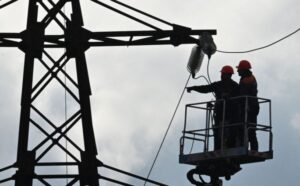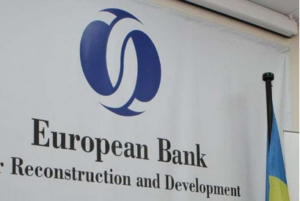
The European Bank for Reconstruction and Development (EBRD) is providing a risk-sharing guarantee without financing in the amount of UAH150 million (EUR3.1 million) to cover half of the loan issued by Ukrsibbank to retailer EVA for the development of its logistics hubs, the company’s press service reported.
“This agreement is an important milestone for EVA and our first experience of cooperation with the European Bank for Reconstruction and Development. We underwent a thorough analysis by the EBRD, which confirmed EVA’s financial stability, the compliance of our activities with the criteria of Ukrsibbank and the EBRD for borrowers, and the recognition of our company as a reliable partner capable of developing its business even in wartime,” said Lilia Volenko, CFO of Rush LLC (EVA and eva.ua network), in a press release.
It is noted that this agreement was the first time the bank used the EBRD’s risk-sharing program (individual investment loan guarantee) to provide an investment loan to a corporate client. Previously, risk sharing rules allowed the bank to share risks only for working capital financing transactions.
According to Volenko, this agreement is a signal to the market about the possibility of attracting long-term financing with the support of international institutions in wartime.
Rush LLC, which manages the EVA chain, was founded in 2002. The chain has over 1,100 stores.
According to YouControl, the owner of Rush LLC is listed as Cyprus-based Incetera Holdings Limited (100%), with Ruslan Shostak and Valery Kiptik as the ultimate beneficiaries.
At the end of the third quarter of 2025, Rush’s net income increased by 18.6% compared to the same period last year, reaching UAH 22.9 billion. Net profit decreased by 14.7% to UAH 1.7 billion.

Serhiy Ustenko, owner of the Carpathian Mineral Waters group, signed a €11 million loan agreement with the European Bank for Reconstruction and Development (EBRD) during the ReBuild Ukraine 2025 conference in Warsaw, according to a Facebook post by the National Association of Extractive Industries of Ukraine.
“The investment will be used to build a modern, energy-efficient beverage production plant in Lviv region, which is an important contribution to Ukraine’s food security and the development of sustainable production,” the statement said.
It is expected that, as part of the implementation of an inclusive employment model, the company will create at least 50% of jobs for veterans and people with disabilities.
“The financing will allow us to expand our production capacity and make our business even more environmentally friendly and socially responsible. Thank you for investing in the development of KMW and food security in Ukraine,” Ustenko said, thanking the EU and the EBRD for their trust and support.
The association recalled that Karpatski Mineralni Vody purchased a special water permit for a new plant near Zolochiv. The company paid UAH 26 million for the plot at auction.
According to the Karpatski Mineralni Vody website, the company began operating in the mineral water market in 1996 with the first bottling of Karpatskaya Dzherelna natural mineral table water. In June 2002, it was reorganized into a plant for the production of mineral water and non-alcoholic beverages, Karpatski Mineralni Vody. At the same time, the company began producing sweet carbonated drinks under the Fruktova Dzherelna and Sokovinka brands, and in 2016, the Dragon energy drink.
CONSTRUCTION, EBRD, KMW, PLANT

The European Bank for Reconstruction and Development (EBRD) plans to provide NEC Ukrenergo with a state-guaranteed loan of up to EUR90 million for the reconstruction of selected substations in the country.
“It is expected that the loan, if possible, will be co-financed by investment grants from international donors totaling up to EUR60 million for the purchase of reserve stocks of electrical equipment and equipment for inter-system connections,” the bank said in a statement on its website.
The project is currently awaiting approval by the bank’s board.
As explained by the EBRD, the goal of the project, with a total cost of EUR 150 million (EUR 90 million + EUR 60 million), is to increase the resilience of the power transmission system in the face of constant attacks to ensure uninterrupted power supply to the population and businesses throughout the country.
In particular, the current loan will be used to reconstruct three existing substations and complete the construction of one new substation in Ukraine, which was started as part of a project financed by the bank in 2014.
The reconstruction of the three existing substations and the completion of the new substation will be carried out in accordance with international best practice, using equipment that meets EU requirements. Some of the damaged or destroyed equipment will be replaced.
Currently, the new substation with 330 kV overhead power lines is being built at the stage of already laid foundations using EBRD loan funds saved as part of the project to build the 750 kV Zaporizhzhya NPP – Kakhovka power line.
As the EBRD recalled, since February 2022, the bank has provided Ukrenergo with three loans as part of its ongoing support, including emergency capital support and emergency investments aimed at restoring the power transmission network after serious damage caused by the Russian military invasion of Ukraine.
According to the EBRD, Ukrenergo has provided the bank with satisfactory reporting on these loans, as well as generally satisfactory reporting in the past. It has the national capacity to implement the bank’s environmental and social requirements (ESR), as well as national and European legislation. The company is strengthening its ESG management system, including inclusive measures, to help it report on sustainability issues in the future in accordance with the EU Corporate Sustainability Reporting Directive (CSRD).
As reported with reference to Maxim Khlapuk, a member of the Verkhovna Rada’s energy committee, as of June 2025, the total amount of credit funds under agreements between Ukrenergo and the EBRD, as well as the European Investment Bank (EIB), amounted to EUR1.22 billion, of which EUR 215.5 million remained unutilized, and with the International Bank for Reconstruction and Development (IBRD) – $509.74 million, of which $54.87 million remained unutilized.
In addition, under two grant agreements between Ukraine and the IBRD for EUR 37.7 million and $200 million, EUR 18.9 million and $134.5 million remained unutilized, respectively.
EBRD, LOAN, POWER GRID, RECONSTRUCTION, SUBSTATION, UKRENERGO

The European Bank for Reconstruction and Development (EBRD) will provide Lviv Bank with an unsecured loan in UAH for up to EUR 40 million and guarantees for EUR 31.5 million to cover the credit risk of new loans to the Ukrainian bank for a total amount equivalent to EUR 45 million.
According to the EBRD website, the Board of Directors approved the relevant projects at a meeting on October 22 this year.
According to the published materials, the loan will be provided in four equal tranches of EUR 10 million each, of which one tranche is currently reserved. It will consist of two components: at least 75% under the EBRD Resilience and Livelihoods Program and up to 25% under the EU4Business-EBRD Credit Line with incentives to finance long-term capital investments of MSMEs.
Funding under the Resilience and Livelihoods program will be used to provide loans to private MSMEs in Ukraine, including those that have relocated their businesses to the western part of Ukraine due to the ongoing war.
As for the guarantee project, unlike most similar projects with larger banks, it will cover 70% of the risk, not 50% as usual. It is noted that the mechanism will include two sublimits with a covered portfolio: EUR 36 million under the Resilience and Livelihoods Guarantee product and EUR 9 million under the EU4Business-EBRD Incentive Credit Line.
The EBRD indicates that Bank Lviv is a regional bank focused on MSMEs operating in western Ukraine with total assets of EUR333 million (0.5% of the market, 23rd out of 60 banks) and a loan portfolio (mainly to MSMEs) of approximately EUR212 million as of the end of the second quarter of 2025 (1.2% of the market). Bank Lviv has its head office in Lviv and 20 branches.

Ukraine’s economy may grow by about 4% in 2025, but the outlook remains fragile and depends entirely on external factors. This is stated in the latest report of the European Bank for Reconstruction and Development (EBRD) Regional Economic Prospects: Under Pressure.
According to the document, the main source of support for the Ukrainian economy is international financial aid, which is used to cover budget expenditures, social payments and defense. An additional driver of growth is the export of agricultural products through the EU “solidarity corridors” and alternative routes along the Danube and overland, which partially compensates for restrictions on maritime transportation.
There has also been a gradual recovery of infrastructure, including roads, bridges and the power grid, which is supporting economic activity.
However, the EBRD warns of high risks. Among them are a protracted war, high levels of public debt and inflation, as well as the vulnerability of export flows, which could be sharply reduced if sea routes are blocked.
According to the bank’s experts, digitalization of public services, agro-technology and development of renewable energy remain promising areas for Ukraine. However, this requires sustainable peace or conflict freezing, deeper integration with the EU market, as well as progress in judicial and anti-corruption reforms.
At the end of 2024, Ukraine’s GDP was estimated at around $160 bln. More than 60% of exports were agro-products (grain, oilseeds and processed products). The metallurgy, IT and energy sectors also retain potential for recovery.
The EBRD emphasizes that the Ukrainian economy is “under pressure”, but with continued international support and access to external markets, it can grow rapidly, laying the foundations for post-war transformation.

The European Bank for Reconstruction and Development (EBRD) may provide Bank Lviv with an unsecured loan in hryvnia for up to EUR 40 million and guarantees for EUR 31.5 million to cover the credit risk on new loans to the Ukrainian bank for a total amount equivalent to EUR 45 million.
According to the EBRD website, its Board of Directors plans to consider the relevant projects at its meeting on October 22 this year.
According to published materials, the loan is planned to be provided in four equal tranches of EUR 10 million each. It will consist of two components: at least 75% under the EBRD’s Resilience and Livelihoods Program and up to 25% under the EU4Business-EBRD Credit Line with incentives to finance long-term capital investments by MSMEs.
As for the guarantee project, unlike most similar projects with larger banks, it covers 70% of the risk, rather than the usual 50%. It is noted that the mechanism will include two sub-limits with a covered portfolio: EUR 36 million under the Sustainability and Livelihoods Guarantee product and EUR 9 million under the EU4Business-EBRD credit line with incentives.
The EBRD notes that Bank Lviv is a regional bank focused on MSMEs operating in western Ukraine, with total assets of EUR 333 million (0.5% of the market, ranked 23rd among 60 banks) and a loan portfolio (mainly SMEs) of approximately EUR 212 million as of the end of the second quarter of 2025 (1.2% of the market). Bank Lviv has its head office in Lviv and 20 branches.